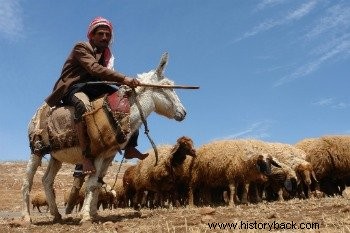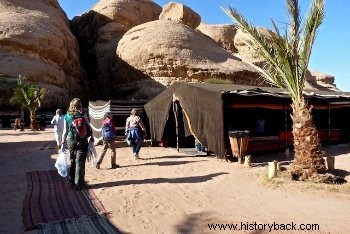The Bedouins are an ethnic group that inhabit the deserts of the Middle East and North Africa, in regions of Saudi Arabia, Syria, Iraq, Jordan and Egypt. They constitute about 10% of the inhabitants of the Middle East.
The term “Bedouin” derives from the Arabic plural badawī , which means nomad, as well as from the words albedu (inhabitants of the open lands) and albeit (tent people). Anyway, it's a word used to designate the nomadic inhabitants of the desert since very ancient times.
The origin of the Bedouins dates back to the time of hydraulic civilizations, with evidence of their existence in Ancient Egypt.
It was with the expansion of Islam, in the 7th century, and with the subsequent Arab conquests, that the Bedouins settled in African territories.

Despite being considered a society frozen in time, the Bedouins have undergone many changes since the 19th century.
At that time, they switched from a nomadic lifestyle to a more sedentary and semi-nomadic lifestyle. This occurred as a result of the pressures exerted by the governments of the territories where they used to roam, mainly the government of the then Ottoman Empire.
With the wars of the 20th century this process intensified. Beginning in the 1950s, many Bedouins settled in cities such as Egypt, Israel, Jordan, Iraq, and Tunisia. There they found salaried work (a practice until then abhorred by the Bedouins) in the oil extraction companies.
In fact, they became citizens in these nations and today their customs survive in cultural festivals held by Bedouin communities in the cities.
Customs and Way of Life
Bedouin customs are based on codes of honor and the traditional system of justice (the Law of Talion or “an eye for an eye, a tooth for a tooth”).
Your society groups into clans and branches into different tribes, which have status differentiated based on the importance of their ancestors.
In fact, their customs are based on family tradition of a patriarchal nature. Their society is ruled by the oldest member of the tribe, the sheikh (šayḫ ), which ascends through patriarchal lineage. The marriage is viewed with optimism by Bedouins, as it brings new men to the tribe.
Another important factor is the religious aspect . Most of the Bedouins follow the Islamic religion, in which some very important aspects of the customs of this people are present. The influence of this culture on the religious formation of Mohammed, the founder of Islam, is a known fact.
When they settle in a certain place, usually an oasis, the Bedouins pitch their tents with wooden structures, goatskin, fabrics and vegetable fibers. These tents measure over 6 meters long and 3 meters high.

As for the division of labor , men are engaged in trade, herding and war. Women are in charge of artisanal production and household care.
Due to the desert climate in which they live, they need to move between the existing oases in the desert to survive. Bedouins take advantage of these trips to practice herding and trade, which are the main activities carried out by Bedouins.
Unsurprisingly, the most common sight of this people through the deserts are the caravans that cross large extensions in search of water and commerce.
Of your herds , composed mainly of goats, sheep and camels, extract the milk, meat and skin they need to survive. Note that the camel is fundamental in these cattle, as it is the most used means of transport, due to its resistance to the desert climate.
Once assembled, the tent receives a mat over the sand and is ready for habitation. On the other hand, some Bedouins have a more sedentary lifestyle, especially in Africa, where they practice agriculture and extensive animal husbandry.
You may also be interested in:
- Arab Culture
- Arab Empire
- Mohammed
